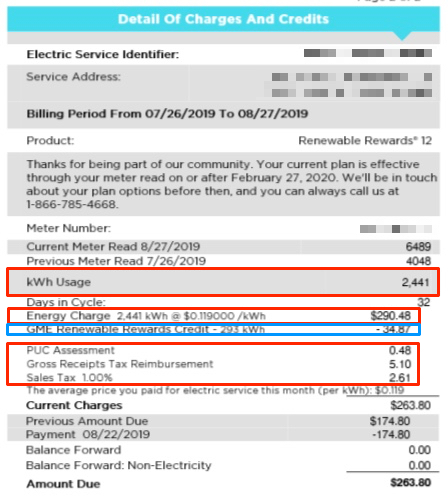
This was a question I had, back when I was starting to consider getting a plug-in vehicle. I get asked this a lot, so here’s the quick answer:
Take your entire bill amount and divide that by the total number of kilowatt hours (kWh) on that bill.
In my bill (above), total energy usage for that billing period was 2,441 kWh.
The total bill was $263.80.
Therefore, my price per kilowatt hour is $0.1081 ($263.80 ÷ 2,441 kWh), or just under 11¢.
For most of you, this will suffice and you can stop here and jump down to the red text below. My bill is a little different, due to our solar panels. Energy generated by my panels and used to power my home do not pass through the meter, so they are automatically missing from the bill (a good thing). However, my energy provider, Green Mountain Energy pays me for energy generated, but not used to power my home (like on a summer morning, before the air conditioner starts running). If my panels produce more energy than my entire home use requires, the surplus is sold back to Green Mountain Energy at the same retail price I pay for electricity. In some areas, your garbage pickup may be part of your electric bill, so this is how we would calculate these slightly more complicated bills:
Total energy usage stays the same (2,441 kWh).
I do not subtract the refund I got for surplus energy generated. Think of this as pretending I do not have solar panels. So total energy cost is $290.48. If your bill has some non-energy charges/refunds, you too would just ignore these items, like I did. But wait! There’s more…
There are taxes and fees that need to be added back in. In my case, that’s the “PUC Assessment” ($0.48), “Gross Receipts Tax Reimbursement” ($5.10) and Sales Tax ($2.61). That gets added to my “Energy Charge,” because without me paying those items, they’d turn off my electricity. So, my revised calculation looks like this:
Total energy cost is now: $290.48 + 0.48 + 5.10 + 2.61 = $298.67 (instead of the total billed amount of $263.80).
Cost per kilowatt hour is $298.67 ÷ 2,441 kWh = $0.1224, or just over 12¢ per kWh.
Now, we can look at what it costs to fill the battery pack.
Let’s say I drive a Chevy Bolt EV, which has a 60 kWh battery pack. If it was completely empty, filling it would cost $0.1224 (price per kWh) X 60 (battery capacity in kWh). So, filling the battery at my home would cost $7.34.
However, there’s a little more to it. Not all the energy that gets fed to the car is used for charging. Some of the energy is used to run fans to cool the battery pack and by systems to monitor the charging process. There are also inefficiencies involved in the transfer of energy from the house to the car. According to the Department of Energy, about 80% of the energy sent to the EV makes it into the battery pack. To factor that in, $7.34 ÷ 0.80 = $9.18.
According to the government, the Bolt EV averages 238 miles per full charge. That means, it would cost $0.039 per mile ($9.18 ÷ 238) to drive the Bolt EV.
Now, how many miles do you typically drive, per day? Most Americans drive 40 miles per day or less. If I drove a Bolt EV 40 miles, my cost would be $1.56 ($0.039 per mile X 40 miles). If I consistently drive 40 miles per every day, in a month, my entire fuel cost would be $46.80 ($1.56 per day X 30 days).
How does that compare to a gasoline powered vehicle? Let’s take a car that gets 30 miles per gallon. According to GasBuddy.com, gasoline currently costs $2.59 per gallon. Therefore, in this theoretical 30 MPG car, it would cost $0.086 per mile ($2.59 ÷ 30) to drive. That’s about 2.2 times as much as the Bolt EV, and 30 MPG is considered to be great gas mileage!
How much do you spend, on gasoline, in a month?
